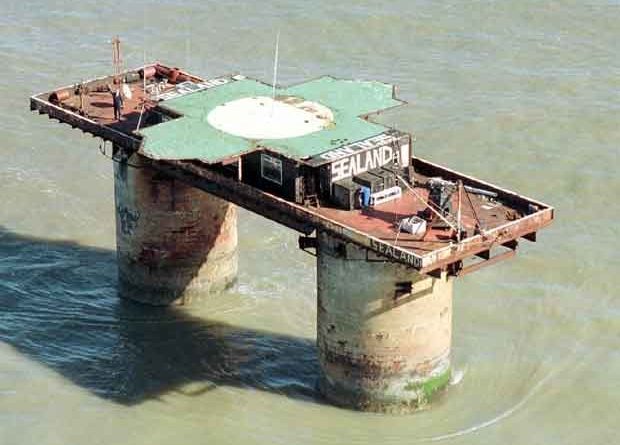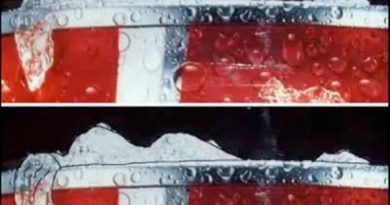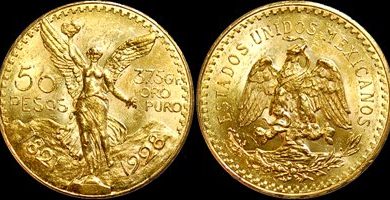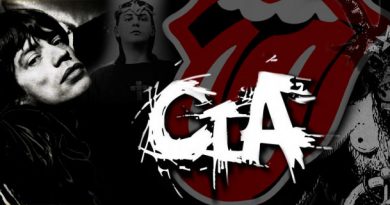Principality of Sealand – World’s Smallest Country
The Principality of Sealand is an unrecognized entity, located on HM Fort Roughs, a former WW II Maunsell Sea Fort in the North Sea 13 kilometres (7 nmi) off the coast of Suffolk, England, United Kingdom. This country possibly will never be member of United Nations, but in Guinness book of records is smallest country in the world.It is Sealand, a state which has all the characteristics of the state, flag, coat of arms, passport, currency and your prince and princess.
Since 1967 the facility has been occupied by family and associates of Paddy Roy Bates, who claim that it is an independent sovereign state. Bates seized it from a group of pirate radio broadcasters in 1967 with the intention of setting up his own station at the site. He established Sealand as a nation in 1975 with the writing of a constitution and establishment of other national symbols. Bates moved to mainland Essex when he became elderly, naming his son Michael regent. Bates died in 2012 at the age of 91.
While it has been described as the world’s smallest nation, or a micronation, Sealand is not currently officially recognised by any established sovereign state. Although Roy Bates claimed it is de facto recognised by the United Kingdom (after an English court ruled it did not have jurisdiction over Sealand as territorial water limitations were defined at that time) this action does not constitute de jure recognition.
History of HM Fort Roughs
In 1943, during WW II, HM Fort Roughs was constructed by the United Kingdom as one of the Maunsell Forts, primarily for defence against German mine-laying aircraft that might be targeting the estuaries that were part of vital shipping lanes; it comprised a floating pontoon base with a superstructure of two hollow towers joined by a deck upon which other structures could be added. The fort was towed to a position above the Rough Sands sandbar, where its base was deliberately flooded to allow it to sink to its final resting place on the sandbar. The location chosen was approximately 7 nautical miles from the coast of Suffolk, outside the then three-mile territorial water claim of the United Kingdom and therefore in international waters.The facility (called Roughs Tower or HM Fort Roughs) was occupied by 150–300 Royal Navy personnel throughout World War II; not until well after the war, in 1956, were the last full-time personnel taken off HM Fort Roughs.
On 2 September 1967, the fort was occupied by Major Paddy Roy Bates, a British subject and pirate radio broadcaster, who ejected a competing group of pirate broadcasters. Bates intended to broadcast his pirate radio station, Radio Essex, from the platform. In 1968, British workmen entered what Bates claimed to be his territorial waters in order to service a navigational buoy near the platform. Michael Bates (son of Paddy Roy Bates) tried to scare the workmen off by firing warning shots from the former fort. As Bates was a British subject at the time, he was summoned to court in England on firearms charges following the incident. But the court ruled that as the platform (which Bates was now calling “Sealand”) was outside British jurisdiction, being beyond the then three-mile limit of the country’s waters, the case could not proceed. In 1975, Bates introduced a constitution for Sealand, followed by a flag, a national anthem, a currency and passports.
Legal status
The claim that Sealand is an independent sovereign state is based on the contention that a 1968 decision of an English court, in which it was held that Roughs Tower was in international waters and thus outside the jurisdiction of the domestic courts.
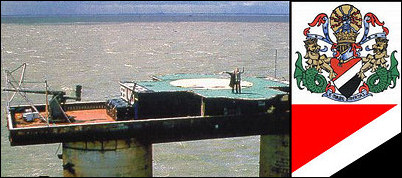
In international law, the two most common schools of thought for the creation of statehood are the constitutive and declaratory theories of state creation. The constitutive theory was the standard nineteenth-century model of statehood, and the declaratory theory was developed in the twentieth century to address shortcomings of the constitutive theory. In the constitutive theory, a state exists exclusively via recognition by other states. The theory splits on whether this recognition requires “diplomatic recognition” or merely “recognition of existence”. No other state grants Sealand official recognition, but it has been argued by Bates that negotiations carried out by Germany constituted “recognition of existence”. In the declaratory theory of statehood, an entity becomes a state as soon as it meets the minimal criteria for statehood. Therefore recognition by other states is purely “declaratory”.
In August 1978, while Bates and his wife were in England, Alexander Achenbach, who describes himself as the Prime Minister of Sealand, hired several German and Dutch mercenaries to spearhead an attack of Roughs Tower. They stormed the tower with speedboats, jet skis and helicopters, and took Bates’ son hostage. Bates was able to retake the tower and capture Achenbach and the mercenaries. Achenbach, a German lawyer who held a Sealand passport, was charged with treason against Sealand and was held unless he paid DM 75,000 (more than US$35,000 or £23,000). The governments of the Netherlands, Austria and Germany petitioned the British government for his release, but the United Kingdom disavowed his imprisonment, citing the 1968 court decision. Germany then sent a diplomat from its London embassy to Roughs Tower to negotiate for Achenbach’s release. Roy Bates relented after several weeks of negotiations and subsequently claimed that the diplomat’s visit constituted de facto recognition of Sealand by Germany.
Following his repatriation, Achenbach and Gernot Pütz established a “government in exile”, sometimes known as the Sealand Rebel Government, or Sealandic Rebel Government, in Germany. Achenbach’s appointed successor, Johannes Seiger, continues to claim via his website that he is Sealand’s legitimate ruling authority.
Post-1990 history
- 1997: Because of the massive number of passports not issued by Sealand in circulation (estimated at 150,000),[6] the Bates family revoked all Sealand passports, including those that they themselves had issued over the previous twenty-two years.
- 2006: On the afternoon of 23 June 2006, the top platform of the Roughs Tower caught fire due to an electrical failure. A Royal Air Force rescue helicopter transferred one person to Ipswich hospital, directly from the tower. The Harwich lifeboat stood by the Roughs Tower until a local fire tug extinguished the fire. All damage was repaired by November 2006.
- In January 2007, The Pirate Bay attempted to purchase Sealand after harsher copyright measures in Sweden forced them to look for a base of operations elsewhere.
- 2007–2010: Sealand was offered for sale through the Spanish estate company InmoNaranja. Since a principality cannot technically be sold, Sealand’s current owners plan to transfer “custodianship”. The asking price is €750 million (£600 million, US$906 million).
- 2012: Sealand online casino is expected to be opened by late 2012.
- 9 October 2012: Roy Bates, Prince of Sealand, died after suffering Alzheimer’s disease for several years. He was succeeded by his son Michael
In 1987, the UK extended its territorial waters from three to twelve miles. Sealand now sits inside waters that Britain claims as its territory.[36] The United Kingdom is one of 162 states to sign the United Nations Convention on the Law of the Sea (in force since 1994), which states in part V, article 60, that: “Artificial islands, installations and structures do not possess the status of islands. They have no territorial sea of their own, and their presence does not affect the delimitation of the territorial sea, the exclusive economic zone or the continental shelf.” In the opinion of law academic John Gibson, “because Sealand was man-made there was little chance that it would be recognised as a nation.”
Irrespective of its legal status, Sealand is managed by the Bates family as if it were a recognised sovereign entity and they are its hereditary royal rulers. Roy Bates styled himself as “Prince Roy” and his widow “Princess Joan”. Their son is known as “His Royal Highness Prince Michael” and has been referred to as the “Prince Regent” by the Bates family since 1999. In this role, he apparently serves as Sealand’s acting “Head of State” and also its “Head of Government”. At a micronations conference hosted by the University of Sunderland in 2004, Sealand was represented by Michael Bates’ son James, who was referred to as “Prince Royal James”. The facility is now occupied by one or more caretakers representing Michael Bates, who himself resides in Essex, England.
Sealand’s constitution was instituted in 1974. It consists of a preamble and seven articles. The preamble asserts Sealand’s independence, while the articles variously deal with Sealand’s status as a constitutional monarchy, the empowerment of government bureaux, the role of an appointed, advisory senate, the functions of an appointed, advisory legal tribunal, a proscription against the bearing of arms except by members of a designated “Sealand Guard”, the exclusive right of the sovereign to formulate foreign policy and alter the constitution, and the hereditary patrilinear succession of the monarchy. Sealand’s legal system is claimed to follow British common law, and statutes take the form of decrees enacted by the sovereign. Sealand has issued passports and has operated as a flag of convenience state, and it also holds the Guinness World Record for “the smallest area to lay claim to nation status”.Sealand’s motto is E Mare Libertas (From the Sea, Freedom). It appears on Sealandic items, such as stamps, passports, and coins, and is the title of the Sealandic anthem. The anthem was composed by Londoner Basil Simonenko; being an instrumental anthem, it does not have lyrics. In 2005, the anthem was recorded by the Slovak Radio Symphony Orchestra and released on their CD National Anthems of the World, Vol. 7: Qatar – Syria.
Economy
Sealand has been involved in several commercial operations, including the issuing of coins and postage stamps and the establishment of an offshore Internet hosting facility, or “data haven”. Sealand also has an official website and publishes an online newspaper, Sealand News. In addition, a number of amateur athletes “represent” Sealand in sporting events, including unconventional events like the egg throwing world championship, which the Sealand team won in 2008. According to Sealand News, a movie called Sealand is in development.It is currently scheduled to be released in 2013.
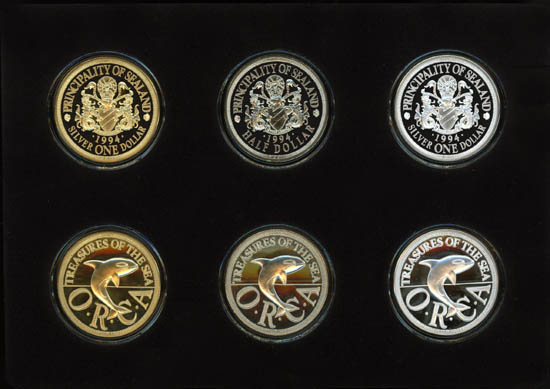
After HavenCo’s unexpected collapse, Sealand’s government began the process of building an online casino. The casino is expected to open by the end of 2012, and would employ about 30 staff members to work in Sealand.
Coins and stamps
Sealandic coins, from left to right: Half Dollar, Silver One Dollar and Quarter Dollar
Several dozen different Sealand coins have been minted since 1972. In the early 1990s, Achenbach’s German group also produced a coin, featuring a likeness of “Prime Minister Seiger”. Sealand’s coins and postage stamps are denominated in “Sealand dollars”, which it deems to be at parity with the U.S. dollar. Sealand first issued postage stamps in 1969, and issues through 1977. No further stamps were produced until 2010. Sealand is not a member of the Universal Postal Union, therefore its inward address is a PO Box in the United Kingdom. Once it is mailed to Sealand’s tourist and government office, it will then be brought to Sealand. Sealand only has one street address, The Row.

Sports
Sealand is not recognised by any major international sporting body, and its population is insufficient to maintain a team comprised entirely of Sealanders in any team sport. However, Sealand claims to have official national athletes, including non-Sealanders. These athletes take part in various sports, such as mini-golf, football, fencing, table football and athletics, although all its teams compete out of the country. The Sealand National Football Association is an associate member of the Nouvelle Fédération-Board, a football sanctioning body for non-recognised states and states not members of FIFA. It administers the Sealand national football team. In 2004 the national team played its first international game against Åland Islands national football team, drawing 2–2
Sealand claims that its first official athlete was Darren Blackburn of Oakville, Ontario, Canada, who was appointed in 2003. Blackburn has represented Sealand at a number of local sporting events, including marathons and off-trail races. In 2004, mountaineer Slader Oviatt carried the Sealandic flag to the top of Muztagh Ata. Also in 2007, Michael Martelle represented the Principality of Sealand in the World Cup of Kung Fu, held in Quebec City, Canada; bearing the designation of Athleta Principalitas Bellatorius (Principal Martial Arts Athlete and Champion), Martelle won two silver medals, becoming the first-ever Sealand athlete to appear on a world championship podium.
In 2008, Sealand hosted a skateboarding event with Church and East Ltd sponsored by Red Bull. Sealand’s fencing team is located in the United States, affiliated with the University of California, Irvine. In 2009, Sealand announced the revival of the Football Association and their intention to compete in a future Viva World Cup. Scottish author Neil Forsyth was appointed as President of the Sealand Football Association. Sealand played the second game in their history against Chagos Islands on 5 May 2012, losing 3–1. The team included actor Ralf Little and former Bolton Wanderers defender Simon Charlton. From early summer of 2012 Sealand has been represented in the flat track variant of Roller derby, by a team principally composed of skaters from the South Wales area.
